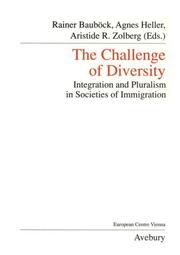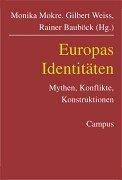| Listing 1 - 10 of 12 | << page >> |
Sort by
|

ISBN: 1859724019 Year: 1996 Publisher: Aldershot Avebury
Abstract | Keywords | Export | Availability | Bookmark
 Loading...
Loading...Choose an application
- Reference Manager
- EndNote
- RefWorks (Direct export to RefWorks)
Book
ISBN: 9783319899053 9783319899046 331989904X 3319899058 Year: 2019 Publisher: Cham, Switzerland Springer
Abstract | Keywords | Export | Availability | Bookmark
 Loading...
Loading...Choose an application
- Reference Manager
- EndNote
- RefWorks (Direct export to RefWorks)
This open access book raises crucial questions about the citizenship of the European Union. Is it a new citizenship beyond the nation-state although it is derived from Member State nationality? Who should get it? What rights and duties does it entail? Should EU citizens living in other Member States be able to vote there in national elections? If there are tensions between free movement and social rights, which should take priority? And should the European Court of Justice determine what European citizenship is about or the legislative institutions of the EU or national parliaments? This book collects a wide range of answers to these questions from legal scholars, political scientists, and political practitioners. It is structured as a series of three conversations in which authors respond to each other. This exchange of arguments provides unique depth to the debate. --
Political sociology --- Sociology --- Politics --- International law --- Public law. Constitutional law --- Public administration --- sociologie --- politiek --- burgerschap --- internationaal recht --- publiek recht --- Citizenship --- #SBIB:39A6 --- #SBIB:321H30 --- Birthright citizenship --- Citizenship (International law) --- National citizenship --- Nationality (Citizenship) --- Political science --- Public law --- Allegiance --- Civics --- Domicile --- Political rights --- Etniciteit / Migratiebeleid en -problemen --- Hedendaagse politieke en sociale theorieën (vanaf de 19de eeuw): algemeen (incl. utilitarisme, burgerschap) --- Law and legislation --- Citizenship. --- Political sociology. --- Public international law. --- Political science. --- Political Sociology. --- Public International Law . --- Political Science. --- European Union --- citizenship --- voting rights --- social rights --- free movement --- EUDO Citizenship --- Globalcit --- Open access
Multi
ISBN: 9783319927190 9783319927183 3319927183 Year: 2018 Publisher: Cham Springer Open
Abstract | Keywords | Export | Availability | Bookmark
 Loading...
Loading...Choose an application
- Reference Manager
- EndNote
- RefWorks (Direct export to RefWorks)
This open access book discusses how national citizenship is being transformed by economic, social and political change. It focuses on the emergence of global markets where citizenship is for sale and on how new reproduction technologies impact citizenship by descent. It also discusses the return of banishment through denationalisation of terrorist suspects, and the impact of digital technologies, such as blockchain, on the future of democratic citizenship. The book provides a wide range of views on these issues from legal scholars, political scientists, and political practitioners. It is structured as a series of four conversations in which authors respond to each other. This exchange of arguments provides unique depth to current debates about the future of citizenship.--
Political sociology --- Sociology --- Politics --- International law --- Public law. Constitutional law --- Public administration --- sociologie --- blockchain --- politiek --- burgerschap --- internationaal recht --- publiek recht --- Citizenship --- Citizenship, Loss of
Digital
ISBN: 9789048504268 Year: 2006 Publisher: Amsterdam Amsterdam University Press
Abstract | Keywords | Export | Availability | Bookmark
 Loading...
Loading...Choose an application
- Reference Manager
- EndNote
- RefWorks (Direct export to RefWorks)
Book
ISBN: 9789089641083 9789048502257 9089641084 904850225X 9786612401916 1282401912 9781282401914 6612401915 Year: 2009 Publisher: Amsterdam : Amsterdam University Press,
Abstract | Keywords | Export | Availability | Bookmark
 Loading...
Loading...Choose an application
- Reference Manager
- EndNote
- RefWorks (Direct export to RefWorks)
The two most recent EU enlargements in May 2004 and in January 2007 have greatly increased the diversity of historic experiences and contemporary conceptions of statehood, nation-building and citizenship within the Union. How did newly formed states determine who would become their citizens? How do countries relate to their large emigrant communities, to ethnic kin minorities in neighbouring countries and to minorities in their own territory? And to which extent have their citizenship policies been affected by new immigration and integration into the European Union? Citizenship Policies in the
Citizenship --- Citizenship --European Union countries. --- Law - Europe, except U.K. --- Law - Non-U.S. --- Law, Politics & Government --- Oost-Europa --- Centraal-Europa --- Citizenship - European Union countries --- Estonie --- République tchèque --- Lituanie --- Pologne --- Hongrie --- Roumanie --- Bulgarie --- Slovénie --- Croatie --- Turquie --- Chypre --- Lettonie
Book
ISBN: 9089642382 9048512662 9789048512669 9789089642387 Year: 2010 Publisher: Amsterdam : Amsterdam University Press,
Abstract | Keywords | Export | Availability | Bookmark
 Loading...
Loading...Choose an application
- Reference Manager
- EndNote
- RefWorks (Direct export to RefWorks)
Diaspora and transnationalism have become popular concepts in academic as well as political discourses. Although originally referring to quite different phenomena, they increasingly overlap in today's usage. There is a conflation of meanings that goes hand in hand with a danger of reifying collective identities. The authors of this much-needed volume choose instead to analyse diaspora and transnationalism as research perspectives rather than as characteristics of particular social groups. The contributions focus on conceptual uses, theoretical challenges and methodological innovations in the s
Emigration and immigration. --- Intercultural communication. --- Transnationalism. --- Transnationalism --- Emigration and immigration --- Political Science --- Immigration & Emigration --- Law, Politics & Government --- Social sciences. --- Behavioral sciences --- Human sciences --- Sciences, Social --- Social science --- Social studies --- Immigration --- International migration --- Migration, International --- Trans-nationalism --- Transnational migration --- Civilization --- Population geography --- Assimilation (Sociology) --- Colonization --- International relations
Book
ISBN: 9789089642387 Year: 2010 Publisher: S.l. Amsterdam university press
Abstract | Keywords | Export | Availability | Bookmark
 Loading...
Loading...Choose an application
- Reference Manager
- EndNote
- RefWorks (Direct export to RefWorks)
Diaspora and transnationalism are widely used concepts in academic as well as political discourses. Although originally referring to quite different phenomena, they increasingly overlap today. Such inflation of meanings goes hand in hand with a danger of essentialising collective identities. This book therefore analyses diaspora and transnationalism as research perspectives rather than as characteristics of particular social groups. The contributions focus on conceptual uses, theoretical challenges and methodological innovations in the study of social ties that transcend nation and state boundaries. This volume brings together authors from a wide range of fields and approaches in the social sciences, as studying border-crossing affiliations also requires a crossing of disciplinary boundaries. Diaspora en transnationalisme zijn veel gebruikte begrippen in zowel het academische als het politieke discours. Hoewel beide termen oorspronkelijk naar heel verschillende fenomenen verwijzen, overlappen ze elkaar tegenwoordig steeds meer. Deze inflatie van betekenis gaat hand in hand met een gevaar van stereotypering van collectieve identiteiten. Daarom analyseert dit boek diaspora en transnationalisme als onderzoeksperspectieven in plaats van als kenmerken van bepaalde sociale groepen.
Migration. Refugees --- Social stratification --- #SBIB:39A6 --- sociologie, cultuur --- etnisch-culturele minderheden --- 316.7 --- Etniciteit / Migratiebeleid en -problemen --- Cultuursociologie --(algemeen) --- 316.7 Cultuursociologie --(algemeen) --- Transnationalism. --- Emigration and immigration. --- Transnationalisme --- Emigration et immigration --- Emigration and immigration --- Transnationalism --- Trans-nationalism --- Transnational migration --- International relations --- Immigration --- International migration --- Migration, International --- Population geography --- Assimilation (Sociology) --- Colonization --- Émigration et immigration --- Aspect social

ISBN: 3593372312 Year: 2003 Publisher: Frankfurt : Campus,
Abstract | Keywords | Export | Availability | Bookmark
 Loading...
Loading...Choose an application
- Reference Manager
- EndNote
- RefWorks (Direct export to RefWorks)
Group identity --- National characteristics, European --- Europeans --- Ethnicity --- Identité collective --- Européens --- Ethnicité --- Congresses --- Ethnic identity --- Congrès --- Identité ethnique --- Identité collective --- Européens --- Ethnicité --- Congrès --- Identité ethnique --- Congresses.
Book
Year: 1997 Volume: 04/97 Publisher: Cambridge : Harvard Law School,
Abstract | Keywords | Export | Availability | Bookmark
 Loading...
Loading...Choose an application
- Reference Manager
- EndNote
- RefWorks (Direct export to RefWorks)
Book
ISBN: 2802715445 Year: 2002 Volume: 2 Publisher: Bruxelles Bruylant
Abstract | Keywords | Export | Availability | Bookmark
 Loading...
Loading...Choose an application
- Reference Manager
- EndNote
- RefWorks (Direct export to RefWorks)
Minorities --- Minorités --- Legal status, laws, etc. --- Droit --- 351.85 <493> --- Overheidstaken i.v.m. wetenschappen, kunst, kultuur--België --- 351.85 <493> Overheidstaken i.v.m. wetenschappen, kunst, kultuur--België --- Minorités --- Culture and law --- Law --- Jurisprudence --- Law and culture --- Philosophy
| Listing 1 - 10 of 12 | << page >> |
Sort by
|

 Search
Search Feedback
Feedback About UniCat
About UniCat  Help
Help News
News